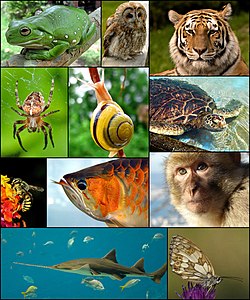| Centroneuralia Temporal range: | |
|---|---|
 | |
| Diversity of centroneuralians, showcasing vertebrates (Chordata), mollusks (Protostomia, Spiralia) and arthropods (Protostomia, Ecdysozoa) | |
| Scientific classification | |
| Kingdom: | Animalia |
| Subkingdom: | Eumetazoa |
| Clade: | ParaHoxozoa |
| Clade: | Bilateria |
| Clade: | Centroneuralia Telford, 2021 |
| Clades | |
Centroneuralia is a proposed clade of animals with bilateral symmetry as an embryo, consisting of the Chordata and Protostomia, united by the presence of a central nervous system. An alternative to the traditional protostome-deuterostome dichotomy, it has found weak support in several studies. Under this hypothesis, Centroneuralia would be sister to Xenambulacraria (Xenacoelomorpha + Ambulacraria) at the base of Bilateria. [1] [2] [3] [4]
Centroneuralia, as a proposed clade, originates in phylogenomics. More precisely, recent studies correlate support for Deuterostomia with simpler, site-homogeneous models, while more sophisticated and site-heterogeneous models recover Centroneuralia more often. [1]
